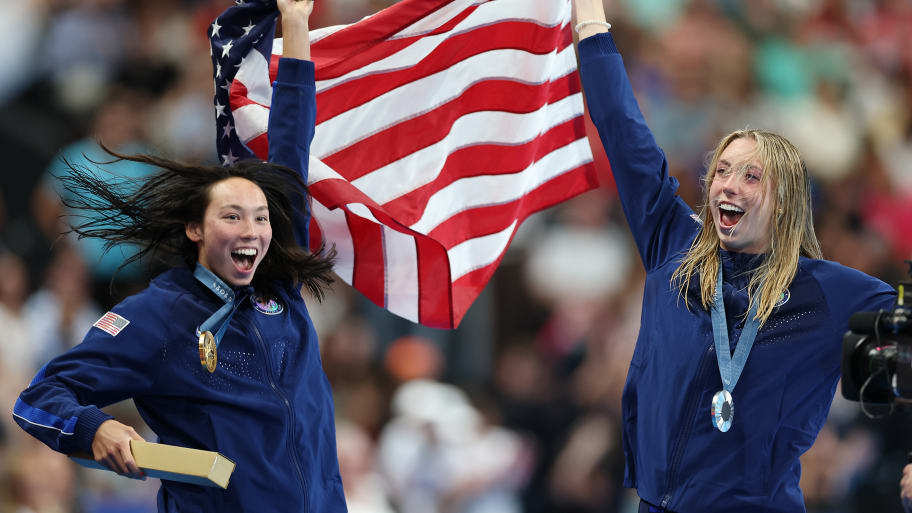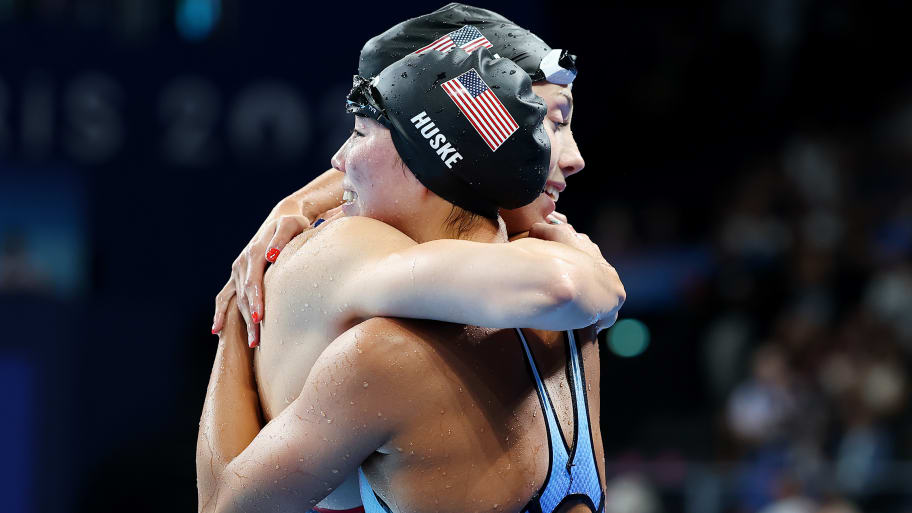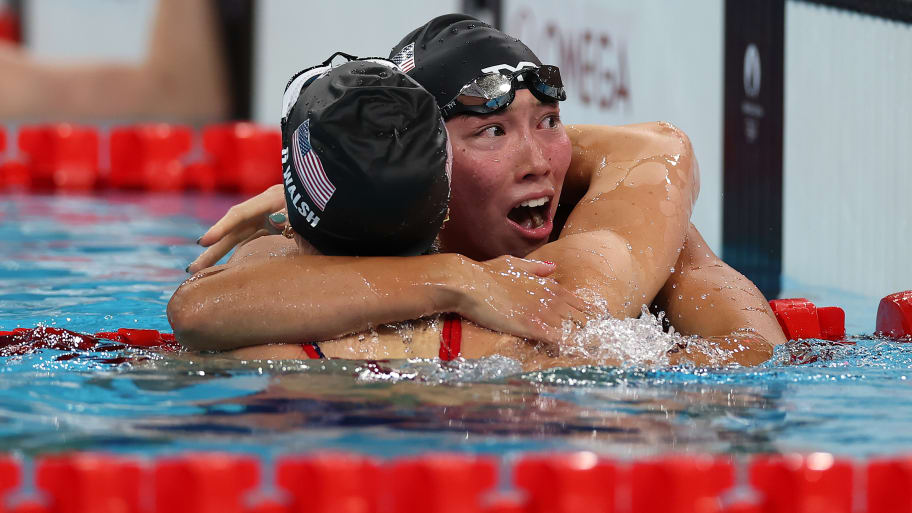
PARIS — Hang it in the Louvre, Torri Huske.
Team USA’s part-time painter and sketch artist authored her Olympic Games masterpiece Sunday night, upsetting American teammate Gretchen Walsh to win the 100-meter butterfly gold medal by four-one-hundredths of a second. She’s smart and artsy, a reader and a thinker and a hard driver who now has splashed her boldest work on an aquatic canvas.
This was a self-portrait of a determined woman who stayed the course after missing a medal in the final meters in the same event at the Tokyo Olympics, ending up a .01 off the podium. This was a monument to faith in herself—and her coach. This was a time-lapse montage of joy and disbelief, as Huske broke into tears before even leaving the La Défense Arena pool and then barely remembered the moment later.
“It was just very surreal,” she said, an American flag wrapped around her shoulders. “I didn’t even know how to process it. It’s just very overwhelming when you’ve been dreaming of this moment for so long.”
Huske said before the trip to Paris that she was hoping to sketch some of the Old World architecture she saw here. Artwork is a release and a creative outlet, something she took lessons at as a child and now indulges in whenever she has time. She’s even taken to decorating sneakers, and was commissioned by fellow U.S. swimmer Beata Nelson to design a pair of hightop for Nelson’s wedding.
“I think it really helps with mindset and flow,” the 21-year-old Stanford star said earlier this month. “You just kind of get very lost in it. There’s definitely times when it’s not relaxing—it’s frustrating when something is not turning out the way you want it to. But I think it definitely helps with observation—taking in the world around you.”
The swimming world around Huske was a bit shocked Sunday night. But in broad brush strokes, she may have painted the biggest upset of this Olympic competition so far.
It’s not that Huske wasn’t capable of winning—it was more a case of Walsh looking incapable of being beaten. Last month at Olympic trials, Walsh obliterated the world record in the 100 fly. Then Saturday she broke the Olympic record in the event and threatened her own world mark.
Today, Walsh has the records, but Huske has the gold.

Huske made a classy gesture to her American teammate at the medal ceremony, calling her up to stand on the top step of the podium with her while the “Star Spangled Banner” played. She had more than enough joy to go around after America dominated the 100 butterfly like nobody has since East Germany in 1988, the last time a country went 1-2 in the event.
The two are physical opposites who excel at the same event by getting the most out of their disparate bodies. Walsh is a towering specimen at well-muscled 6'3", while Huske is a lithe 5'8". She might be slight, but somehow Huske generates remarkable power.
When Walsh is introduced for a race, she waves with two hands and smiles. Huske is all business, marching quickly to her lane and shedding her warmups as fast as possible before going to pound the back fin on the starting block. Their starts reflect those differences as well—Huske is as fast as it gets off the blocks, while Walsh takes considerably longer to launch her full length into the air.
And don’t think the start doesn’t matter. Reaction time Sunday was .63 for Huske, second-fastest in the race. Reaction time for Walsh was .75, slowest in the race. Given the final margin of .04, that loomed large.
But the winning swim truly was artistry at the finish, culminating a perfectly executed plan relying on controlled tempo and closing speed. Stanford coach Greg Meehan says he thought Huske had gotten a little impatient in the preliminaries and semifinals, spinning too fast in the first 50 meters and not having enough left to finish strong. This race was an adjustment.
Truth be told, it’s hard for Huske not to over-swim at the start of a race. She’s just naturally fast, a quick-twitch athlete who can blaze off the block and reach top speed in no time. There’s certainly nothing wrong with that, but it can lead to “spinning” as Meehan puts it, more than catching and pulling water.
In the final, Huske was right where she needed to be at the turn, sitting in third but close to Walsh’s pace. In the final meters she put a poetic reversal on her Tokyo fate, surging where she came up short three years ago.
At those last Games, Huske looked like she might win gold with 10 meters left. But she mistimed her finish just enough to finish fourth, missing the Tokyo podium by the smallest of measurable time and missing gold by only .14. “That was devastating,” Huske said. “But I think that it really fueled me, and I think it did make me better.”
Part of that was simply experience—life and swimming experience.
“It just didn’t feel real,” she said of the Games in 2021. “I just couldn’t believe I was there, because your whole life you hear about the Olympics—when I was young I never really thought I would become an Olympian. When it’s so big in your head, it’s very hard to come to terms that you’re actually there.”

After Tokyo, Huske matriculated to Stanford, a place she has loved, but at a time of great turnover among Olympic swimmers. Katie Ledecky and Simone Manuel left after Tokyo, and at the end of 2021–22 school year Regan Smith departed for Arizona State. A year later, Claire Curzan transferred to Virginia.
After some up-and-down results, there was speculation that Huske might seek a change herself.
“She made the decision to stay, in spite of some challenges,” Meehan said. “I think that really strengthened our bond, and our trust in each other. Swimming is not a linear progression—even the greatest have little blips along the way. She also loves being around her teammates.”
Huske took a gap year from Stanford to focus on swimming, having taken overly large class loads in previous quarters.
As it turned out, Meehan and Stanford still know what they’re doing. This is now the third straight Olympics that a Stanford swimmer has won a gold medal, with Huske following Ledecky in 2021 and Maya DiRado and Simone Manuel in 2016.
It was enough to create a series of emotional scenes on the pool deck.
“He was bawling,” Huske said with a laugh.
“Water works,” Meehan admitted. Then he pulled Huske’s gold medal out of his back pocket, after being asked to hold onto it while she attended post-race drug testing and media obligations.
“Isn’t that beautiful?” he asked.
It was the final flourish of beauty adorning Torri Huske’s masterpiece. Hang the medal around her neck, and hang her race in the Louvre.
This article was originally published on www.si.com as After Narrow Miss in Tokyo, Torri Huske’s Gold Medal Win in Paris Was an Olympic Masterpiece .







